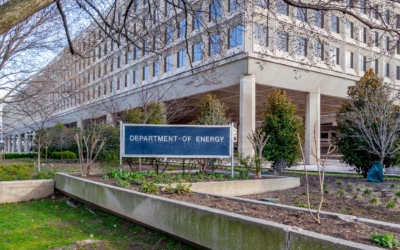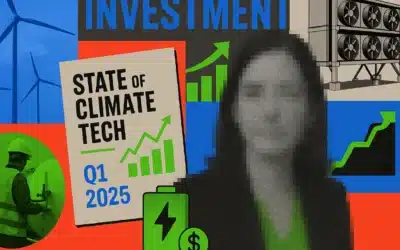Carbon removal technologies are often seen as expensive, unproven, or too small scale to matter. But Adam Fraser, chief executive of Terraset, argues that philanthropy can help change that equation by providing the early stage capital needed to move ideas from lab to market.
“Carbon removal needs to scale and needs significant capital to do that,” Fraser told Climate Solutions News. “Not nearly enough philanthropic capital goes towards climate causes of any kind, carbon removal or otherwise. We have here a huge market, something like $900 billion a year, of which less than 2% goes to any climate-related cause and less than 0.1% to carbon removal.”
Founded in 2022, Terraset is a non-profit that channels donations from individuals, family offices, and foundations into strategic pre-purchases of carbon removal. Its portfolio already includes 22 companies, ranging from well known players like Climeworks and Heirloom to emerging ventures such as Octavia Carbon in Kenya and TerraFixing in Canada.
Fraser says the aim is not to position carbon removal as a purely philanthropic pursuit, but to use philanthropy as a “catalytic” tool. “Philanthropic capital can play a catalytic role in moving it forward, bringing more solutions to market, providing pathways for capital, providing innovative ways that more finance can come into the space.”
A different kind of model
Unlike most climate charities, Terraset does not focus on grants or research funding. Instead, it buys carbon removal upfront, paying companies today for tons of CO₂ that will only be delivered in future. “We pre-purchase, so we pay upfront for carbon that will be delivered later, because we believe that that’s the most catalytic way to move that money,” Fraser explained.
This model provides startups with revenue on the balance sheet, a critical signal for investors and lenders. “They act as a reference point for other buyers. They are revenue on a balance sheet, which makes companies more attractive to investors, which can make debt finance easier to secure.”
Fraser said some suppliers view pre-purchases as “around 25 to 30% more valuable than an off-take agreement after you’ve financed the off-take agreement.”
Navigating skepticism
Carbon markets have long been plagued by accusations of greenwashing and weak standards. Fraser acknowledges that history but believes carbon removal can stand apart. “We believe that carbon removal versus some older, more traditional forms of offsetting carbon is more measurable, more provable, and gives people that security.”
He sees the bigger challenge as one of public understanding. “What we have is an awareness problem rather than a skepticism problem. Once people actually understand carbon removal and are aware of it, the statistics in terms of people supporting it are very high. The problem is most people don’t know what carbon removal is.”
That lack of awareness makes transparency and rigor essential. Terraset operates a due diligence process with scientific and financial advisors, and Fraser says donors are quick to scrutinize claims. “It’s really important because, you know, as you know, donors care about rigor. They want to know that if they are giving money to something, it’s going to be impactful.”
Prefer to listen to the interview? Play it here or find the podcast on Spotify, Apple Podcasts, Amazon or other platforms.
A diverse portfolio
Terraset has deliberately spread its bets across geographies and methods. “We are really proud to work with Octavia Carbon in Kenya. They were Africa’s first direct air capture company,” Fraser said. With abundant geothermal and wind resources, Octavia is aiming to develop DAC at low cost while creating jobs and livelihoods in sub-Saharan Africa.
At the other extreme is TerraFixing, a Canadian company testing cold weather direct air capture. “They are working closely with Indigenous communities around the renewable energy power in their work,” Fraser noted. Other portfolio firms include Carbon Run, which adds limestone to rivers to enhance carbon uptake, and companies experimenting with microbial mineralisation in soils.
The scale of support varies. Terraset has written cheques exceeding $1 million for some suppliers, while smaller commitments of $50,000 have proved decisive for others. “For the stage of the company and where they were, that’s been really impactful. It’s led to follow on funding from other people. It’s allowed them to move forward.”
Donor motivations
Why are wealthy families and foundations turning to Terraset rather than backing traditional offsets or renewable energy? Fraser says motivations fall into three categories. “There are people who care very much about the quantum of carbon. The second group… are more concerned with how the sector scales. And then the third group is those who are thinking about the co-benefits,” such as river health or wildfire prevention.
That range of priorities underscores the sector’s flexibility. Carbon removal can be framed as a straightforward ton for ton emissions solution, or as a way to build wider ecological and social benefits.
Scaling up
So far Terraset has raised close to $10 million, a significant sum for a two year old charity, but modest compared to the billions climate experts say will be needed. “Even though I said philanthropy will only be a drop in the bucket of the bigger picture, the role it has is critical,” Fraser said.
New financing tools may extend that impact. The Schmidt Family Foundation recently backed Terraset to pilot a revolving fund: the organisation pre-purchases carbon, resells the delivered credits to corporates, and then recycles the proceeds into further pre-purchases. “We kind of keep the flywheel spinning with future pre-purchases,” Fraser explained.
Beyond carbon removal, Terraset has begun exploring how its model could apply to methane abatement or refrigerant destruction, sectors with huge climate relevance but limited funding.
Role of government
Ultimately, Fraser emphasises, philanthropy is no substitute for state action. “This space needs to exist at a scale that just requires government involvement. It requires regulation. It requires policy.” While Terraset avoids direct lobbying, it collaborates with policy-focused groups such as Carbon180, the Carbon Removal Alliance, and Carbon Gap.
Different countries will take different approaches, Fraser acknowledges, but alignment is essential. “This is a global problem and you get alignment between governments, but obviously policy usually comes in on a national basis.”
Everyone can play a role
Despite Terraset’s high profile donors, Fraser insists the model is open to anyone. “Let’s say [we want] also donors with small checks. You can go to our website and you can donate $10. You can donate $20. Now, if you are someone who wants to come and donate a million dollars, that’s very welcome. But I think we believe that everyone can play a role in this, and that’s important.”
For Fraser, the urgency is clear: “There’s a timing issue here, both in terms of scaling this particular piece and in terms of tipping points in the climate. Now is a time to be accelerating this work, not slowing down.”




